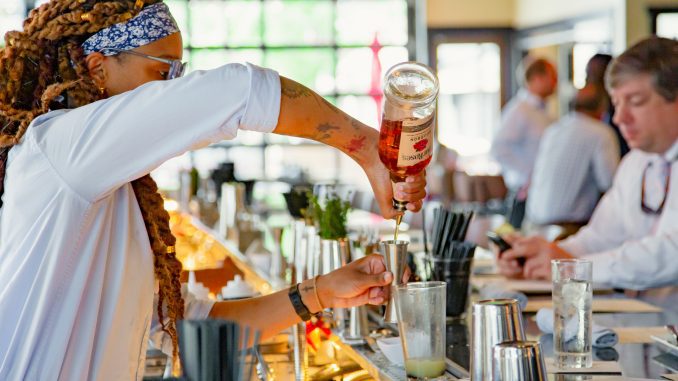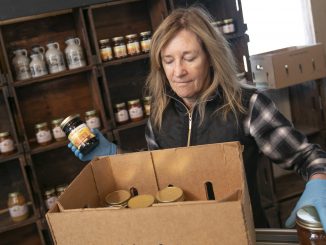
RALEIGH — A year into the nation’s fight against COVID-19, owners of restaurants, bars, gyms, beauty salons and other small businesses continue to struggle to stay afloat. Despite two rounds of federal stimulus, a majority of small businesses still need help. The Wall Street Journal recently cited Federal Reserve data showing 88% of small firms say sales have not returned to normal, and that restaurants and bars have lost 2.4 million jobs since last March. Although CNBC reports 63% of small business owners support President Biden’s new $1.9 trillion relief package, confidence among these firms has tumbled to its lowest level in four years. The number of small business owners saying they believe they can continue operating for more than a year under current business conditions fell from 67% in the fourth quarter of last year to 55% in the first quarter of 2021.
The North Carolina Restaurant and Lodging Association has been advocating for more help for struggling businesses since the beginning of the pandemic and just presented a new bill before the General Assembly asking for $300 million in stimulus money to help the hospitality sector stay afloat. Lynn Minges, President and CEO of NCRLA says the bill is one part of its “Blueprint for Revival of the North Carolina Hospitality Industry,” which details the impact COVID-19 restrictions have had on the hospitality industry and outlines policy-related priorities for recovery.
In addition to the stimulus request, NCRLA’s blueprint includes a letter asking Governor Cooper to ease restrictions on business operations when the current Executive Order expires on February 28. “In addition to [financial] relief, it is critical that we get back to normal business operations as quickly as possible,” Minges says. “Throughout the pandemic, NCRLA has actively advocated all levels and all branches of government for relief for the hospitality industry. With the easing of restrictions that we are calling for along with appropriate state stimulus to help businesses recover from the losses they have already sustained, we believe that NC restaurants, bars, hotels and event venues will be well-positioned to rebound and recover from the devastating impacts of COVID-19.”
Two North Carolina-based restaurants have made headlines recently for having received financial assistance from the national small business relief effort known as the Barstool Fund. Barstool Sports, a digital media company that produces content focused on sports and pop-culture runs the Barstool Fund. The company was founded in 2003 and is currently headquartered in New York City. The relief effort is geared toward small businesses including gyms, bars and restaurants. To date the group has raised over $35 million since the start of the pandemic and has nearly 217,000 supporters. They have supported over 260 businesses from coast to coast over the last year including Clover Joe’s Sandwich Shoppe in Charlotte and Spiro’s Family Restaurant in High Point.
Clover Joe’s owners Joseph and Randi Killelea say their eatery in uptown Charlotte can best be described as a funky old school sandwich house. The “joint” is perhaps best known for its cheesesteak sandwich and has been around for over a decade. Earlier this year they submitted a video to Barstool Sports showing why they needed funds. In the heartfelt post Randi walks in the shop and says, “I come in every day, by myself and I work it. I used to have a staff of six, plus my husband and myself, but we couldn’t keep up with the business. We need help.” She shows a totally empty space and describes how their income went from $25,000 a month to $3,000. Clover Joe’s had a built-in customer base of regulars due to its proximity to downtown workers, however once the pandemic hit, Killelea says foot traffic in uptown Charlotte disappeared and devastated their bottom line.
Spiro’s Family Restaurant is a family run business that has been serving the High Point community since July 1995. Their motto is “Success has to be earned, it is not given.” Spiros and Kathy Turnas run the establishment along with their four children. Kathy says they also submitted a video to Barstool.com asking for help after their landlord refused to forgive even part of their lease payment when Spiro’s sales revenue was down 50% at the height of the pandemic. “We lost at least 50% in revenue. We closed for one week to figure out the best plan to switch to carry out only and make a to go menu. We had to lay off several employees but have since brought those that want to come back, back,” Turnas says.
It’s not just restaurants and bars that are reaping the Barstool Fund’s benefits. Other beneficiaries include Watson’s Candies out of Woburn, MA., Dani’s Garden Childcare and Learning Center in Elyria, OH., The Tattoo Room tattoo shop in Simi Valley, CA. Bearfoot Yoga & Wellness Center in Bay Shore, NY. and Afton House Inn in Afton, MN.
In order to qualify, a business must still have their employees on payroll and be able to make the case that without the aid they won’t be able to stay afloat. Once a business is accepted into the program, the fund promises to keep reupping their financial assistance every month that goes by where things do not improve from an economic standpoint. The fund’s operators want the public to know they can make a tax-deductible contribution to support the small businesses featured on their website.



